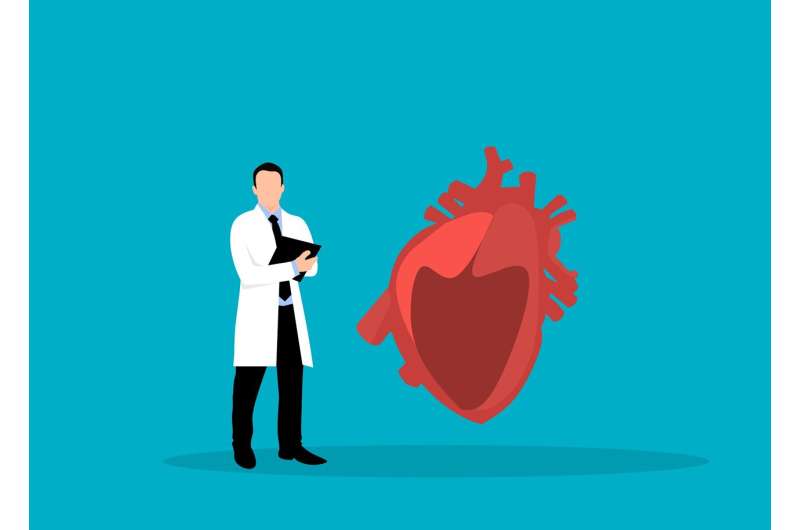
Credit: Pixabay/CC0 Public Domain
Imagine someone you care about suddenly experiencing chest pain, turning pale, and breathing heavily. These are some of the symptoms of a heart attack.
Cardiovascular diseases (CVDs) are the leading cause of death globally. The World Health Organization estimates that 19.8 million people died from CVDs in 2022. Of these deaths, 85% were due to heart attack and stroke.
Patients who suffer a heart attack require prompt treatment in hospital. Beta-blockers are a type of medication that reduces the strain on the heart.
However, is this medication necessary for everyone who has had a heart attack?
Patients with no or mild heart damage should also receive beta-blockers
While patients with heart damage after a heart attack are prescribed beta-blockers to protect their heart, not all patients sustain the same level of damage.
Do these patients also require beta-blockers?
“There has been considerable uncertainty in the medical community regarding whether all patients need beta-blockers. There has been very little research on patients whose hearts function entirely or nearly normally after a heart attack,” says Professor Dan Atar from the University of Oslo and chief physician in cardiology at Oslo University Hospital.
Two new large studies now point in the same direction.
“The studies demonstrate that beta-blockers have a protective effect and reduce the risk of new heart attacks even among those patients with little or no heart damage,” explains John Munkhaugen, a professor at the University of Oslo and a cardiologist at Drammen Hospital.
The studies have been published in the New England Journal of Medicine and The Lancet.
Beta-blockers reduce the risk of arrhythmias
A heart attack is a serious cardiac condition that occurs when a blood clot blocks one of the arteries supplying blood to the heart, depriving it of essential oxygen. After a heart attack, it is crucial to prevent further heart attacks and other complications.
“Many patients go home with minor damage to the heart muscle following the attack. This can lead to a decrease in the heart’s pumping function and other complications,” Munkhaugen explains.
Beta-blockers are taken in pill form.
“They have a protective effect on the heart by reducing heart rate and stress on the heart. They also lower the risk of irregular heartbeats, known as arrhythmias,” he states.
Hospitals and patients from across Norway contributed to the research
One of the two new studies was a substantial collaboration between Norway and Denmark.
“A total of 5,700 patients participated in the study. About half of them came from hospitals throughout Norway, meaning the entire Norwegian cardiology community contributed,” explains Atar.
All patients in the study had suffered an acute heart attack within the past 14 days and had only minor or no heart damage afterwards. The participants were randomly divided into two groups. One group received the beta-blocker metoprolol as part of their treatment, while the other group received only alternative treatments without beta-blockers.
The researchers closely monitored the patients for three and a half years, comparing the two groups. They investigated whether patients had experienced another heart attack and whether they had other heart conditions, such as irregular heartbeat and heart failure.
Patients receiving beta-blockers had a lower risk of additional heart attacks
The researchers assessed heart function following the attack.
“Patients whose heart function was between 40% and 50% showed a slight decrease compared to before the heart attack. Those with heart function above 50% essentially showed no damage to the heart muscle,” Munkhaugen explains.
The results revealed that beta-blockers reduced the risk of subsequent heart attacks.
The difference was most pronounced among patients with minor heart muscle damage, although those with normal heart function also benefited from the treatment with beta-blockers.
“Our study shows that everyone with normal or only mildly reduced heart function should receive beta-blockers as treatment following a heart attack, just like the patients with heart damage do,” he emphasizes.
Findings likely to inform new guidelines for treatment following a heart attack
Beta-blockers have been part of the standard treatment for heart attacks since the 1980s.
“When the first studies on the effectiveness of this medication emerged, it had a tremendous impact on the field,” notes Atar.
Since then, significant medical advancements have occurred in both the diagnosis and treatment of heart attacks.
“Cardiologists around the world have therefore been uncertain as to whether beta-blockers remain an effective treatment for all patients,” the professor points out.
The results from the two new studies form a new knowledge base in the field.
“These findings could significantly influence heart attack treatment globally,” Atar asserts, adding that they will likely be incorporated into future guidelines for recommended clinical practice.
Further research on age, gender, and patients’ quality of life
New studies on the effects of beta-blockers after heart attacks are currently underway. The researchers will examine subgroups of heart attack patients.
“Perhaps there are differences related to age or gender, and some subgroups might benefit more from beta-blocker treatment than others,” Munkhaugen suggests. “This will be addressed by forthcoming research as we move into autumn.”
Additionally, the researchers will investigate patients’ quality of life.
“We plan to study anxiety, depression, sleep problems, nightmares, and sexual dysfunction. These symptoms have been associated with beta-blocker use,” the professor explains. “We aim to examine these issues to provide patients with the best possible treatment and follow-up.”
More information:
John Munkhaugen et al, Beta-Blockers after Myocardial Infarction in Patients without Heart Failure, New England Journal of Medicine (2025). DOI: 10.1056/NEJMoa2505985
Xavier Rossello et al, β blockers after myocardial infarction with mildly reduced ejection fraction: an individual patient data meta-analysis of randomised controlled trials, The Lancet (2025). DOI: 10.1016/S0140-6736(25)01592-2
Provided by
University of Oslo
Citation:
Beta-blockers recommended for all heart attack patients, even those with no or mild damage (2025, September 3)
retrieved 4 September 2025
from https://medicalxpress.com/news/2025-09-beta-blockers-heart-patients-mild.html
This document is subject to copyright. Apart from any fair dealing for the purpose of private study or research, no
part may be reproduced without the written permission. The content is provided for information purposes only.

